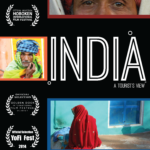A social media and compliance specialist for Actiance, Joanna Belbey is finding that it’s also possible for her to embrace independent filmmaking.
(While working on online educational programs for the securities industry, Joanna Belbey got the bug for filmmaking. She was running a financial services compliance training company for several years before her current role as a social media and compliance specialist for Actiance, a solutions provider that offers a platform to manage social media channels. Belbey says that she is doing her heart’s work and that while she has a busy schedule, many of her day-job skills are easily transferable to making movies.)

Joanna Belbey
Q: What made you get into filmmaking by the way?
A: It happened a number of years ago. I was working at a regulator for the securities industry and I was tasked with creating online educational programs, and we did that in a studio.
I really fell in love with the whole process of communicating using film. So, I got very interested and I was supervising a set of people, cameramen and directors. I decided I needed to learn more about it and went to school. I went to the New School for a while, and then I went to the New York University School of Continuing Education, to learn about film-making and digital production.
So, it really changed from something that happened while I was at work that sparked my interest in the process.
Q: Well, that’s interesting. The job pushed you into that realm?
A: I discovered that as a business professional and as a person who does marketing, as someone who does projects, I find that my skills are very transferable to the world of film-making. I understand budgets. I understand projects. I know how to delegate. I know how to manage. Those are all essential skills for producing films and television.
Q: Can we talk a little bit about the film that you’ve done recently?
 A: It’s ‘India: A Tourist’s View.’ It’s a four-minute short that I submitted to several festivals, and it was accepted into four film festivals so far, and they were: The Art of Brooklyn Film Festival; the Golden Door Film Festival which is in Jersey City, N.J.; the Hoboken International Film Fest; and the [YoFi Fest] Yonkers Film Festival. And so that was really validation that I was on the right track.
A: It’s ‘India: A Tourist’s View.’ It’s a four-minute short that I submitted to several festivals, and it was accepted into four film festivals so far, and they were: The Art of Brooklyn Film Festival; the Golden Door Film Festival which is in Jersey City, N.J.; the Hoboken International Film Fest; and the [YoFi Fest] Yonkers Film Festival. And so that was really validation that I was on the right track.
If you’ve ever been to a film fest, they’re an awful lot of fun. You get to see films and talk with filmmakers and producers. I think they’re terrific for people who are starting out in film-making; I really recommend it.
Right now, I’m working on another project. It’s more of probably a web series, and the idea is that you can travel the world without leaving New York.
The premise is that we’re going to be visiting different neighborhoods and talk about those neighborhoods. We’ll see culturally what they’re like, where the people come from in those neighborhoods, why they came to New York, what did they bring with them? What type of food do they eat? What type of entertainment do they watch? A little bit about their culture. I’ve actually shot a first episode pilot and now we’re in post-production.
Q: How do you get the funding for this?
A: Oh, it’s out of my own pocket. It’s out of the great job I have.
Q: Some of the web series have actually been able to generate money and keep going.
A: It’s all very doable. I mean, the dream is to have a network or cable station pick it up. … As a beginning filmmaker, I was really stuck on, ‘How am I going to make money doing this?’ It stopped the creativity. It sort of got in the way. It all became about, ‘Is this commercially viable? Will I be able to show it?’ It all became about the business instead of the art.
So once I let go of that, and said, ‘I have a job that I like. I’m just going to do my job, and I’m going to do this in the evening or long weekends. I’m just going to follow my heart here.’ Once I was able to make that shift, then I’ve been a lot happier, because now I’m doing what I think is interesting, what’s fun for me. I’m beginning to get results.
Q: A lot of people say, ‘If you do what you love, then the money will follow.’
A: Well, yes, if you’re 22. But I’m not. I have a couple of homes. I have a lifestyle I like. I like to travel. It’s not like I want to go back and be a struggling artist. I don’t think you can even do that anymore in New York, right? So, it’s not practical for me at this point.
Q: How do you balance everything though? Because you said you’ve got a pretty big job, and making movies is not easy.
A: One informs the other … I’m doing my heart’s work. It’s something I really love. That makes me grateful for my job, makes me grateful for my benefits, my salary. It enables me to do the thing I love. I don’t have a lot of ‘sit around the sofa’ time, but that’s OK. … I work very hard and I work a lot of hours. It doesn’t seem to bother me.
Q: I work on plays and other things and actually have a web series idea that I’m working on. But in journalism, at least old school journalism, it was looked down upon. It was considered, ‘Oh, you must be something less if you’re doing something else.’ I never saw it that way. I always saw it as, ‘Well, I’m talented. I can do this. Why am I being put down for it?’ But that’s the way it is.
A: I agree with you 100 percent … I’ve always had a lot of different interests and learned really quickly in business that you really weren’t supposed to talk about those other interests, because people would think you weren’t committed to your primary position.
The thing that changed it for me was social media because I am a very active social media user, and I’m completely transparent. I am one person, so my business and my professional life and my filmmaking life is all out there on social media, for all to see.
Once I made that shift about five years ago, since I became so transparent, I get great reactions from people, frankly. I get great reactions from people in business who are attorneys and legal and compliance people are fascinated with the fact I’m a filmmaker.
Q: Does your social media expertise help you promote your movies?
A: Yes, I use it to promote the films [and] the film fests that I’m in. I use it to meet people I might want to talk to. I use it to meet other filmmakers. I use it as a communications tool primarily, more communications than just marketing or broadcasts, if you will. I use it to share what I’m doing and to support fellow filmmakers. It’s interesting. I go to these film fests, and we connect on Facebook afterwards. It becomes a strong community, even though it’s online. We support each other, and it’s great. … There are no secrets anymore with social media.
Q: Do you have any advice for other people who are maybe not where you are but are thinking about pursuing their passions?
A: I think it’s important to pursue your passion. It took me a long time to figure that out. I used to think, ‘I don’t have any passion,’ which wasn’t the case.
I think it’s just a question of deciding you want to do and just do it. It’s also important to have supportive people in your life. I’m married. My husband’s very supportive of my filmmaking, so I think that’s also helpful as well.
It’s just a question of finding the time … if you’re good in business, you’re probably good at time management.
Q: Yesterday, each place I had gone to in New York, there were these huge movie trucks. I was very jealous. I wanted to be a part of it.
A: But if you look at those big sets of hundreds of people. You have to be super-organized to do that. You not only have to have creative vision; you have to have the right people in place to manage all that. Every minute you’re spending a lot of money. I love seeing those film trucks too or the ones for TV shows. They always make me smile.
Need a Reprint?
Leave a Reply